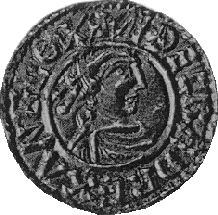Related Research Articles
Amalric or Amalaric is a personal name derived from the tribal name Amal and ric meaning "ruler, prince".
Cormac is a masculine given name in the Irish and English languages. The name is ancient in the Irish language and is also seen in the rendered Old Norse as Kormákr.
Charibert is a Frankish given name meaning "glorious warrior". The name Berthar contains the same two elements in reversed order. It is the same name as Herbert, Heribert and Aribert.
Theodosius is a given name. It may take the form Teodósio, Teodosie, Teodosije etc. Theodosia is a feminine version of the name.
Simeon is a given name, from the Hebrew שמעון, usually transliterated as Shimon. In Greek, it is written Συμεών, hence the Latinized spelling Symeon. It is a cognate of the name Simon

Æthelred or Ethelred is an Old English personal name and may refer to:

The title archimandrite, used in Eastern Christianity, originally referred to a superior abbot whom a bishop appointed to supervise several "ordinary" abbots and monasteries, or as the abbot of some especially great and important monastery.
Donnchadh is a masculine given name common to the Irish and Scottish Gaelic languages. It is composed of the elements donn, meaning "brown" or "dark" from Donn a Gaelic God; and chadh, meaning "chief" or "noble". The name is also written as Donnchad, Donncha, Donnacha, Donnchadha and Dúnchad. Modern versions include Donnacha, Donagh, Donough, Donogh and Duncan.
Æthelwine, Old English pronunciation:[ˈæθɫˌwi.ne] also Aethelwine or Ethelwine is an Anglo-Saxon given name meaning "noble friend". Its Old High German equivalent is Adalwin.
Wulfgar, Wolfgar and Wolfger are variants of an Old High German masculine given name meaning "wolf-spear". They may refer to:
Abiel is a given name. Notable people with the given name include:
Bertharius was a Benedictine abbot of Monte Cassino who is venerated as a saint and martyr. He was also a poet and a writer. A member of the Lombard nobility, Bertharius as a young man made a pilgrimage to Monte Cassino at the time of the abbacy of Bassacius and decided as a result to become a monk.
Muiredach, Muireadhach or Muireach, anglicized variously to Murdoch, Murtagh, Murray, Murdac, Mordacq and other forms, is a Goidelic name popular in Scotland and Ireland in the Middle Ages:
Máel Brigte is a Pictish or Irish name meaning "devotee of St Brigid".

Tenzin is a Tibetan given name, meaning "the holder of Buddha Dharma". Tenzin can alternatively be spelled as Tenzing and Stanzin as well. Stanzin is generally used by the Ladakhi people, since Ladakhi language retains many archaic forms which have been lost in other modern Tibetan languages. For example, in Standard Written Tibetan, 'Tenzin' is spelled as "bstan'zin"; however, when it is spoken, both the 'b' and the 's' are silent and 'an' becomes 'en' in Standard Lhasa Tibetan. It may refer to any of the following people:
Ó Cuindlis was the name of an Irish family of brehons and scholars from Uí Maine, located in present-day County Galway and County Roscommon, in Connacht. It means 'Descendant of Cuindleas'. It was also spelt with Cuindilis and Cuindleas, later Cuinnlis and Coinlis, and in County Mayo Coinleisc and Coinlisc. The earliest form of the name can be traced back to an abbot from the 8th century, named Cuindles.
Cumméne, also spelled Cuimín, Cummin, Cumin etc., is an early Irish name and may refer to:
Gerasimos is a Greek given name derived from Greek "γέρας". The suffix -ιμος gives the meaning "the one who deserves honour". It can also be anglicized as "Gerassimos" or "Gerasimus". It can also be slavicized as Gerasim.
Erluin, also found in the forms Erluinus, Erlwin, Eorlewinus, Herluin, and Harlewin, is a medieval name, composed of the Germanic elements erl, meaning free man or noble man, and win, meaning friend.
Megingoz is a masculine given name of Germanic origin. It is a compound of roots meaning "strength" and Geats. Latinizations include Megingaudus, Megimgausus, Maingaudus, Maingauldus, Magingotus, etc., whence forms like Mengold and Meingold.
References
- ↑ Laury Sarti, Perceiving War and the Military in Early Christian Gaul (ca. 400–700 A.D.) (Brill, 2013), p. 260.